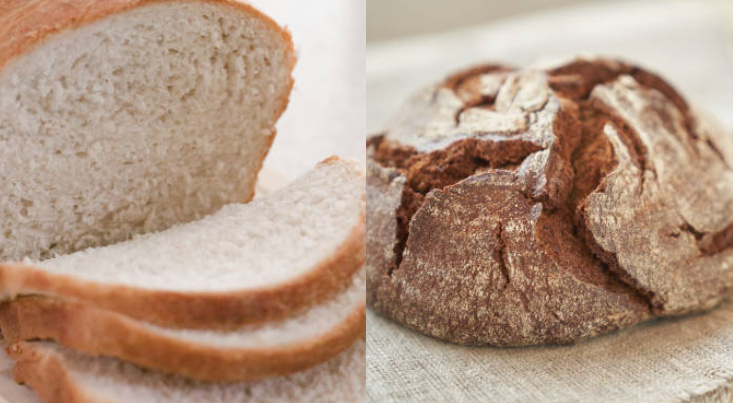The Battle of the Bread: White Bread Vs. Sourdough

What To Know
- The creation of white bread and sourdough is a testament to the skill and artistry of bakers.
- While both white bread and sourdough can be enjoyed as part of a balanced diet, sourdough holds a slight edge in terms of health benefits.
- While both white bread and sourdough have their merits, sourdough emerges as the superior choice for those seeking a healthier and more flavorful bread experience.
In the realm of bread, two titans stand tall: white bread and sourdough. For centuries, these culinary creations have graced our tables, each boasting a unique set of characteristics that have captured the hearts and taste buds of bread lovers worldwide. In this comprehensive analysis, we delve into the depths of white bread vs sourdough, exploring their nutritional profiles, flavor profiles, and the art of crafting these delectable loaves. Join us on this epicurean journey as we uncover the secrets behind these two bread behemoths.
Nutritional Showdown: White Bread vs Sourdough
When it comes to nutrition, white bread and sourdough occupy distinct territories. White bread, crafted from refined flour, offers a quick burst of energy due to its high glycemic index. However, this rapid release of glucose can lead to blood sugar spikes and subsequent crashes. Conversely, sourdough, made with whole grains and fermented with wild yeast and bacteria, boasts a lower glycemic index, ensuring a steadier release of energy. Additionally, sourdough’s fermentation process produces beneficial bacteria, contributing to gut health and overall well-being.
Flavor Face-Off: White Bread vs Sourdough
The flavor profiles of white bread and sourdough stand in stark contrast. White bread, with its mild and neutral taste, serves as a blank canvas for various toppings and accompaniments. Its soft and fluffy texture provides a comforting and familiar experience, making it a popular choice for sandwiches, toast, and everyday meals. Sourdough, on the other hand, possesses a distinct tanginess and depth of flavor derived from its fermentation process. Its crusty exterior and chewy interior create a symphony of textures, while its sour notes add a layer of complexity that appeals to adventurous palates.
The Art of Crafting: White Bread vs Sourdough
The creation of white bread and sourdough is a testament to the skill and artistry of bakers. White bread, often made with commercial yeast, undergoes a rapid rise, resulting in a light and airy loaf. The process is relatively straightforward, requiring careful attention to temperature and timing. Sourdough, on the other hand, demands a more patient and meticulous approach. The sourdough starter, a mixture of flour, water, and wild yeast, is nurtured over time, developing a unique flavor profile. The fermentation process, which can take several hours or even days, imparts sourdough with its characteristic tang and chewy texture.
Health Benefits: White Bread vs Sourdough
While both white bread and sourdough can be enjoyed as part of a balanced diet, sourdough holds a slight edge in terms of health benefits. Its fermentation process produces prebiotics, which nourish beneficial gut bacteria, promoting digestive health. Additionally, sourdough’s lower glycemic index helps regulate blood sugar levels, reducing the risk of insulin resistance and type 2 diabetes. Moreover, sourdough’s prebiotics may enhance the absorption of minerals such as iron and calcium.
Culinary Applications: White Bread vs Sourdough
The versatility of white bread and sourdough extends beyond their primary role as sandwich bread. White bread’s mild flavor and soft texture make it an ideal choice for French toast, croutons, and bread crumbs. Its neutral flavor also allows it to seamlessly blend into various dishes, from casseroles to bread puddings. Sourdough’s tangy flavor and chewy texture shine in sandwiches, grilled cheese, and artisan dishes. Its crusty exterior and chewy interior make it a perfect accompaniment to soups, stews, and charcuterie boards.
The Verdict: White Bread vs Sourdough – A Matter of Taste
In the grand debate of white bread vs sourdough, there is no clear victor. The choice between these two culinary delights ultimately boils down to personal preference. If you seek a mild flavor, soft texture, and quick preparation time, white bread may be your ideal choice. However, if you crave a complex flavor profile, chewy texture, and the potential health benefits of fermentation, sourdough is the way to go. Whichever bread you choose, savor every bite, appreciating the artistry and tradition behind these timeless staples.
Sourdough’s Superiority: A Deeper Dive
While both white bread and sourdough have their merits, sourdough emerges as the superior choice for those seeking a healthier and more flavorful bread experience. Its fermentation process bestows a wealth of benefits, including:
- Improved Digestion: The fermentation process produces lactic acid, which helps break down gluten, making sourdough easier to digest for some individuals.
- Enhanced Nutrient Absorption: Sourdough’s fermentation process also releases phytic acid, which binds to minerals and enhances their absorption.
- Boosted Immunity: Sourdough contains beneficial bacteria that may support a healthy immune system.
Frequently Asked Questions:
1. Is sourdough bread always sour?
Sourdough bread can vary in sourness depending on the fermentation time and the type of starter used. Some sourdough breads may have a mild sourness, while others may be more pronounced.
2. Can I make sourdough bread at home?
Yes, you can make sourdough bread at home. The process requires a sourdough starter, which can be made from a mixture of flour and water. Once the starter is active, you can use it to make sourdough bread following a simple recipe.
3. How long does sourdough bread last?
Sourdough bread typically has a longer shelf life than white bread due to its lower pH level. It can be stored at room temperature for several days or in the refrigerator for up to a week.